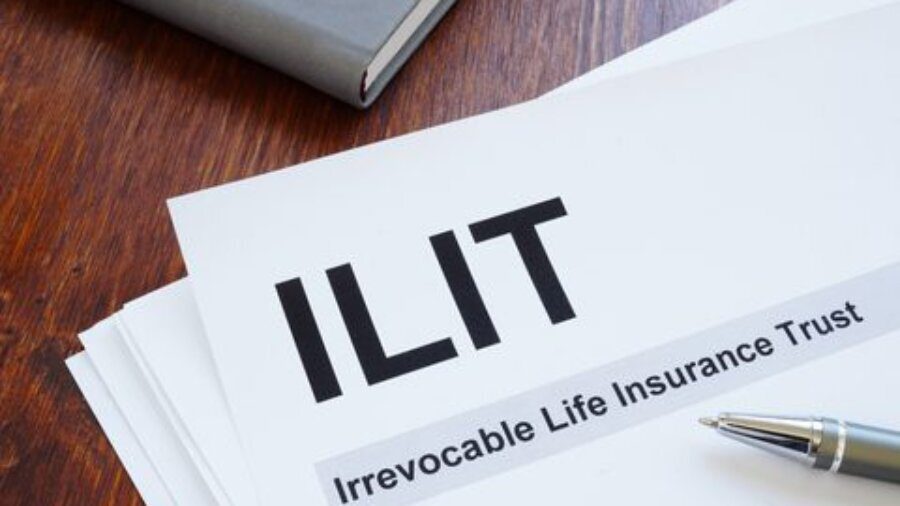One of the best ways to protect your assets and reduce your estate tax liability is to create an Irrevocable Life Insurance Trust (ILIT).
By transferring the ownership of the policy to the ILIT, you remove it from your taxable estate and avoid paying estate taxes on the death benefit.
While implementing a trust within your estate plan may seem complex, we have simplified the setup process into easy-to-follow steps.
In this guide, you’ll discover how to use ILITs to your advantage and keep more wealth in your family.
quick link navigation
- What is a life insurance trust?
- What is an irrevocable life insurance trust?
- What are the responsibilities of trustees in managing ILITs?
- How do you set up an ILIT trust using life insurance?
- How do wealthy people fund an insurance trust?
- How do you buy life for your insurance trust?
- What is the future of ILITs in estate planning?
- FAQ: Life Insurance Trusts
 What is a Life Insurance Trust
What is a Life Insurance Trust
A life insurance trust is a specialized type of trust that serves as the owner and beneficiary of a life insurance policy. Two main categories of trusts are used for this purpose: revocable and irrevocable.
A revocable or living trust allows you to modify it as needed and ensures that your assets are transferred directly to your chosen beneficiaries without going through probate.
It’s important to note that life insurance policies usually bypass probate as policyholders choose beneficiaries when buying the policy. Therefore, a revocable life insurance trust may not be necessary.
However, if you have dependents with special needs or young children who may struggle with managing large sums of money, establishing a revocable life insurance trust can offer more control over how the proceeds are utilized.
While revocable trusts offer flexibility, the policy’s death benefit will still be included in your estate for tax purposes.
Alternatively, placing your insurance policy and other assets into an irrevocable insurance trust ensures they are not considered part of your estate when calculating taxes.
 What is an Irrevocable Life Insurance Trust?
What is an Irrevocable Life Insurance Trust?
An irrevocable life insurance trust (ILIT) is a valuable tool for individuals looking to protect their assets and minimize estate taxes.
Transferring ownership of a life insurance policy into an insurance trust effectively removes the policy’s death benefit from your taxable estate when you pass away.
Insurance trusts also provide asset protection because policies placed within the trust are shielded from creditors or potential claims against them.
Another noteworthy benefit of an ILIT is controlling how the insurance proceeds are distributed after your passing. This provides peace of mind, knowing that your wishes will be carried out according to your instructions.
⊕
Three parties to a life insurance trust
- Grantor: The grantor is the person who establishes and funds the life insurance trust. The gifts made to an ILIT are permanent and cannot be revoked by the grantor.
- Trustee: Once established, control of the assets is relinquished to the trustee, whose important job is managing the trust asset on the grantor’s behalf.
- Beneficiaries: The beneficiaries are named individuals who will receive distributions from the trust after the grantor’s death.
 The Role of Trustees in Managing ILITs
The Role of Trustees in Managing ILITs
Understanding the role of trustees within an Irrevocable Life Insurance Trust is critical for those who have established or are considering setting up such a trust.
The trustee serves as the manager of the insurance trust and is responsible for overseeing its operations in line with the grantor’s wishes and the terms outlined in the trust agreement.
Choosing a reliable and trustworthy individual or company to serve as a trustee is paramount since they will handle your estate matters.
Effective communication is also vital for successful trust management. Let’s delve into some critical responsibilities associated with being a trustee.
- Premium Payments: One primary duty involves ensuring that insurance premiums are paid promptly while informing the grantor about payment amounts and due dates.
- Crummey Letters: Trustees must send annual Crummey letters to beneficiaries, notifying them of their right to withdraw their share of gifts made by the grantor to cover these premiums.
- Policy Monitoring: Trustees maintain regular contact with the insurance company, monitoring policy performance and status on behalf of the ILIT.
- Tax Reporting: Another significant responsibility entails filing tax returns for the insurance trust if required and reporting any gifts made to comply with tax regulations.
- Distribution of Death Benefits: In case the grantor’s demise, trustees ensure proper distribution of policy proceeds among beneficiaries according to trust provisions.
 Establishing an ILIT Trust
Establishing an ILIT Trust
With the current high estate exemption, you might question whether life insurance inside an ILIT is still necessary.
Your beneficiaries only have to pay federal estate taxes if the value of your estate exceeds the current tax exemption threshold. In 2024, the individual estate tax exemption is $13.61 million, doubling for married couples at $27.22 million.
However, according to Kiplinger, these exemptions are temporary and could be dramatically reduced to $10 million (adjusted for inflation) for couples in 2026.
Even if your estate’s value is below the federal exemption amount, you may still have to pay state estate taxes.
According to the Tax Foundation, some states have exemptions, usually not as generous as the federal one, and impose their own set of estate taxes.
If you are an ultra-wealthy family with assets nearing or exceeding the current exemption limit, setting up a separate trust specifically for life insurance is paramount.
For those families with a net worth approaching $10 million, keep monitoring potential reductions in exemption limits in the near future.
Setting up an irrevocable life insurance trust can be complicated, so it is advisable to assemble a team of professionals, including an insurance agent, lawyer, accountant, and trust planner, to guide you through the process.
Establishing an ILIT integrated within your overall estate plan typically costs around $5,000 or more for a competent estate planning attorney.
Furthermore, since irrevocable trusts require filing separate annual income tax returns for the trust itself through a CPA’s assistance, it will incur additional costs.
It would be best to appoint a paid and impartial third-party trustee to manage your insurance trust’s affairs.
Here is an outline for establishing and funding an ILIT trust with a life insurance policy as part of a comprehensive estate planning strategy.
⊕
setting up an ILIT with Survivorship life insurance
- Before buying a life insurance policy, set up an Irrevocable Life Insurance Trust with a lawyer who can prepare the required documents.
- Choose a reliable insurance company and agent to buy the policy from and name the ILIT as both the owner and the beneficiary of the policy.
- Transfer money for premium payments to the ILIT as gifts and let the trust pay the premiums on time.
- By doing this, you can avoid having the death benefits counted as part of your taxable estate when you die.
- After both you and your partner die, the second-to-die policy will pay the death benefits to the trust, which will then follow your instructions in the trust document to distribute them.
 Funding an Irrevocable Life Insurance Trust
Funding an Irrevocable Life Insurance Trust
Adequately funding an ILIT with life insurance necessitates careful planning and coordination to navigate legal and financial considerations effectively.
To avoid including a recently purchased policy in your estate, it is necessary to establish an insurance trust before transferring the policy. Otherwise, the policy will be subject to estate taxes if you pass away within three years of the transfer.
For the ILIT trust to be valid, neither the grantor nor the trustee can have any control or ownership incidents related to the policy. This means they cannot change it, borrow against it, or pay for it.
Open communication with the trustee and the beneficiaries ensures mutual understanding, which will help facilitate the smooth implementation of funding strategies.
It’s helpful to thoroughly understand the unique strategies affluent families utilize to fund an ILIT trust, each with its advantages and considerations.
- Annual Gift Tax Exclusion: The grantor can contribute yearly gifts to the ILIT up to $18,000 per beneficiary in 2024 without incurring gift taxes. The trustee can then use these funds to pay for policy premiums. However, beneficiaries must be notified of their right to withdraw the gift, known as Crummey power.
- Lifetime Gift Tax Exemption: Grantors have a one-time opportunity or multiple chances to make gifts up to their lifetime exemption limit of $12.06 million in 2024 without owing any actual gift taxes. The trustee can use these funds towards premium payments on behalf of the trust.
- Premium Financing: This strategy involves borrowing money from banks to pay policy premiums. Premium financing is an option for grantors with high net worth but limited liquidity. However, it comes with risks like fluctuating interest rates, collateral requirements, and tax implications.
 Survivorship Life Insurance and Trusts
Survivorship Life Insurance and Trusts
ILIT Trusts are created to own and manage life insurance policies, including term, permanent, or second-to-die policies.
While less common, many single people with substantial wealth fund their trust with a universal or whole life insurance policy.
The best option for couples is to buy survivorship or second-to-die life insurance, which covers both spouses and only pays out the death benefit when they both die.
The main reason why people choose second-to-die life insurance is to reduce or avoid estate taxes, which are only applied when the surviving spouse inherits the estate.
So, pairing survivorship life with an irrevocable life insurance trust helps avoid and pay estate taxes and control how the proceeds are utilized.
⊕
BUYING a SURVIVORSHIP LIFE policy
If you’re comparing life insurance policies, make sure only to consider coverage that is guaranteed never to expire before you do.
Survivorship universal life is typically the most affordable coverage option and guarantees that your coverage will last your entire lifetime.
The chart below displays the annual costs for a $1,000,000 survivorship life policy, offering lifelong coverage to healthy couples.
| Ages | Premium | Death Benefit |
| 60/60 | $10,100 | $1,000,000 |
| 65/65 | $13,200 | $1,000,000 |
| 70/70 | $18,200 | $1,000,000 |
| 75/75 | $24,100 | $1,000,000 |

Survivorship Life Insurance Sample Rates
- Select Lifetime
- Select Amount
- Press Get Quote
 The Future of ILITs in Estate Planning
The Future of ILITs in Estate Planning
The future of ILITs in estate planning hinges on changes in estate tax laws, the interest rate environment, and the life insurance industry itself.
Married couples can pass on up to $$25.84 million without paying estate taxes. But this amount might drop to $10 million after 2025 unless lawmakers change their minds.
The lower the estate tax exemption, the more sense it makes to use an ILIT to protect your wealth from Uncle Sam. But if the exemption stays high, you might not need a trust.
Interest rates have a significant impact because they affect the cost of coverage compared to alternative investment options.
You receive less income from fixed-income assets when you have low-interest rates. While permanent coverage becomes slightly more expensive with lower rates, they often outperform conservative investments.
On the other hand, when interest rates are high, you earn more income from fixed-income assets. This could make these investments preferable over permanent coverage for couples with exceptional life expectancy.
Furthermore, changes in interest rates also affect premium financing strategies. Low rates make borrowing money for payments more advantageous. Conversely, higher rates diminish any benefits of borrowing funds for premiums.
Additionally, innovation and competition among providers play a role in shaping the availability, suitability, and affordability of coverage options within an ILIT framework.
As you can see, seeking guidance from our advisors when establishing or modifying an insurance trust is essential to ensure it aligns with your current needs and expectations.
FAQ: Life Insurance Trusts
Is an irrevocable life insurance trust a good idea? A trust can be a valuable tool for those with a high net worth, as it helps minimize estate taxes and ensures that heirs can access liquid assets. This is particularly useful for business owners with most of their wealth tied up in their company, as it provides instant liquidity to pay estate taxes.
Do you need to file taxes for an Irrevocable Trust? An irrevocable trust is considered a separate legal entity and must submit annual income tax returns. If the trust earns more than $600 in income during a tax year, it must file a federal income tax return.
Can you change the beneficiary of an ILIT? Once established, the grantor generally cannot alter its terms, including the beneficiaries. However, there might be certain intricate approaches that could potentially provide some flexibility in changing the beneficiaries.
What are the disadvantages of an irrevocable trust? The downsides include losing control and the inability to revoke the trust. It is advisable to consider a life insurance trust only if you have a substantial estate surpassing the exemption limit and are willing to relinquish ownership and access to the policy.
Can an irrevocable life insurance trust be terminated? While terminating an irrevocable insurance trust can be difficult, one option is to stop making payments on the insurance policy held within the trust, effectively canceling the trust.
Trending Estate Planning Topics
-
Affordable Life USA is a leading independent insurance agency offering comprehensive life insurance solutions to clients nationwide.
Our founder, Eric Van Haaften, brings over 35 years of experience in catering to the life insurance needs of successful individuals and business owners.
Mr. Van Haaften has been featured in prestigious outlets such as Time, Newsweek, US News, and The Wall Street Journal.
Our skilled team of insurance agents and financial planners is committed to securing the ideal coverage that fits your requirements and budget.
Start your search using our insurance calculator to explore quotes from many highly-rated life insurance companies.
Affordable Life USA, LLC

Eric Van Haaften, LUTCF
1-877-249-1358


 What is an Irrevocable Life Insurance Trust?
What is an Irrevocable Life Insurance Trust? The Role of Trustees in Managing ILITs
The Role of Trustees in Managing ILITs Establishing an ILIT Trust
Establishing an ILIT Trust Funding an Irrevocable Life Insurance Trust
Funding an Irrevocable Life Insurance Trust Survivorship Life Insurance and Trusts
Survivorship Life Insurance and Trusts  The Future of ILITs in Estate Planning
The Future of ILITs in Estate Planning



